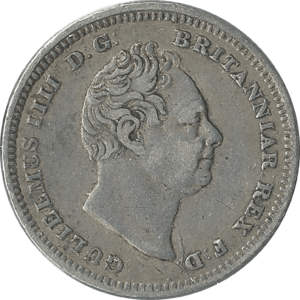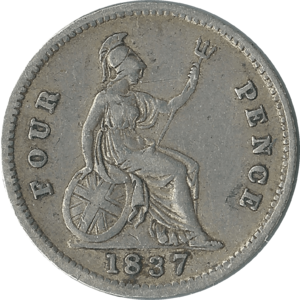Fourpence (British coin) facts for kids
| United Kingdom | |
| Value | 4d sterling |
|---|---|
| Mass | 1.9 g |
| Diameter | 16 mm |
| Thickness | 1 mm |
| Edge | Milled |
| Composition | 92.5% Ag |
| Years of minting | 1836–1855, 1888 |
| Obverse | |
 |
|
| Design | Profile of the monarch (William IV design shown) |
| Designer | William Wyon |
| Design date | 1836 |
| Reverse | |
 |
|
| Design | Britannia |
| Designer | William Wyon |
| Design date | 1836 |
The British fourpence coin was also known as a groat or a fourpenny bit. It was worth four old pennies. This coin was part of the sterling coinage system in the United Kingdom.
Before 1971, the British money system was different. A pound was divided into 20 shillings. Each shilling was worth 12 pence. So, the fourpence coin was a small but useful amount of money. People sometimes called it a "joey" after a politician named Joseph Hume. He thought it would be a good coin to have.
History of the Fourpence Coin
The idea for a fourpence coin came up in 1835. A Member of Parliament (MP) named Joseph Hume suggested it. He thought it would be very handy for paying things like cab fares. The coin was first made in 1836.
However, cab drivers didn't really like it. Before the fourpence, people often paid them with a sixpence and didn't ask for change. With the new fourpence coin, drivers would often only get fourpence. This meant they earned less from each ride.
Later, in 1845, a threepence coin was introduced. This new coin was more popular than the fourpence. By the 1850s, people decided that both coins weren't really needed. The fourpence coin stopped being made for everyday use in 1855.
Even though it wasn't made for general use anymore, some fourpence coins were specially made in 1888. These were for use in British colonies like British Guiana and the British West Indies. The groat stayed in use in British Guiana until 1955.
What the Fourpence Coin Looked Like
The fourpence coin had special designs on its front and back. The back of the coin, called the reverse, showed Britannia. She is a symbol of Britain, sitting down and holding a trident. The words "FOUR PENCE" were written on either side of her. This design was created by William Wyon.
The front of the coin, called the obverse, showed the head of the monarch. When the coin was first made in 1836 and 1837, it showed King William IV. Around his head, it said "GULIELMUS IIII D G BRITANNIAR REX F D". This means "William IV, by the Grace of God, King of the Britains, Defender of the Faith".
From late 1837 onwards, the coins showed Queen Victoria. Her image was also designed by William Wyon. The words around her head said "VICTORIA D G BRITANNIAR REGINA F D". This means "Victoria, by the Grace of God, Queen of the Britains, Defender of the Faith".
The fourpence coins made in 1888 had a different picture of Queen Victoria. This was called her "jubilee head" and was designed by Joseph Boehm. The back of these coins, with Britannia, stayed the same.
There was also a special test coin made in 1836. It had King William IV on the front. But on the back, instead of "FOUR PENCE", it just said "4p".
 | Misty Copeland |
 | Raven Wilkinson |
 | Debra Austin |
 | Aesha Ash |

